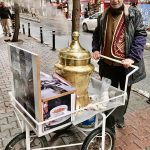The most atmospheric (and often cheapest) placesto shop for fruit and vegetables remain the pazars (street markets) which take place almost everywhere in Turkey on a weekly basis. Usually the same stallholders visit a sequence of settlements in a particular area one after another. For example, in Cappadocia it is market day in Nevşehir on Monday; in Göreme on Wednesday; in Avanos on Friday; and in Ürgüp on Saturday. On the Bodrum Peninsula it is market day in Türkbükü on Monday; in Gölköy on Tuesday; in Bitez, Gümüşlük, Gündoğan and Ortakent on Wednesday; in Bitez and Yalıkavak on Thursday; in Turgutreis on Saturday; and in Gümbet on Sunday.
As well as fruit and veg, most street markets sell a range of fresh cheeses, eggs, some meat, dry biscuits, cleaning materials, some clothes and some fabrics. There will also be a range of plastic goods: washing baskets, washing-up bowls etc. In spring some markets also sell plants, flowers and soil.
Depending on where you are you may also be able to buy local specialities at the market. For example, the Bolu market sells locally-grown mushrooms, while the Uzunköprü market sells fine baskets made by Thracian Roma. The market in Göynük every Monday is a great place to stock up on local cheeses and, perhaps, on some of the tartan material with which the women make their şalvar. Bartın market is known for its strawberry sales in summer.
Except for along the coast, most street markets are aimed at locals rather than visitors. However, coastal markets may also sell items such as fake branded jeans, handbags and souvenirs for tourists.
There is an increasing trend towards relocating erstwhile street markets into all-weather market halls. This may help keep the streets cleaner but something is usually lost in the process. For example, oya (headscarf embroidery) used to be sold on the streets of Gönen during its market. Now everything is sold out of a market hall well away from the centre of town where fewer visitors are likely to find it.
Bit pazarları are flea markets which may also take place on the street. There’s a good one at Tire every Tuesday although these days you shouldn’t really expect too much in the way of bargains.
İstanbul street markets
Pazars still play an important part in the shopping experience even in a city the size of Istanbul and most İstanbullus still live within easy reach of a street market. The largest and most impressive is the Wednesday market at Çarşamba in the Fatih district. Here everything is on sale, from aubergines and melons to cheeses and pastırma, alongside a wide range of cheap clothing and household goods. This is a very conservative neighbourhood so you’ll find yourself shopping alongside women in black chadors and men in baggy pants with big, bushy beards.
Every Wednesday a street market also takes place in the Cankurtaran area of İstanbul, within easy walking distance of most of the “Sultanahmet” hotels. Here shoppers go about their fruit and vegetable shopping in the shadow of the Sphendone, the huge brick structure that once supported the far end of the Hippodrome. Mainly a fruit and vegetable market, it sells cheese, eggs and helva too, making it perfect for stocking up on picnic ingredients.
If you’re staying around Taksim, the biggest and most interesting market is the one that takes place in Tarlabaşı every Sunday. Since this is a poor neighbourhood the produce tends to be very keenly priced.
On the Asian side of İstanbul it’s fun to shop at Kadıköy whose narrow streets are filled with wonderful greengrocers’ shops, delicatessens and fish shops. The colourful and high quality produce is always piled high, and shopkeepers will be happy to let you sample unfamiliar items.
Another particularly interesting market to visit in İstanbul is the Organic Food Market in Feriköy, across the Golden Horn in Beyoğlu. A first for Turkey, this sells fresh produce from all over the country but particularly from Yalova, a market gardening area on the southern side of the Sea of Marmara which is well known for its strawberries, blackberries and grapes. There’s also an organic food market in Kasımpaşa where most of the produce on sale is from the Black Sea region of the country.
Real İstanbul foodies with a taste for the offbeat might like to venture up to “Little Siirt“, a square lurking in the shadow of the great Aqueduct of Valens, the Roman monument that straddles Atatürk Bulvarı as it runs uphill towards Fatih from Unkapanı and the Golden Horn. Here a community from Siirt in south-eastern Turkey has taken root, and their shops offer wonderful, aromatic eyefuls of the sort of produce you won’t find anywhere else in the city. Come here to buy tandır ekmeği, circles of bread that look like doughnuts but which have been dried and need rehydrating before eating, a common rural practise in the days when there wasn’t a bakery on every street corner. Here, too, you’ll find a mouth-watering array of cheeses sold both in tins (teneke) and hairy goatskins (tulum), jar upon jar of fresh honey (bal), and all sorts of dried fruit and vegetables. The butcher’s shops (kasap) still come adorned with sheep’s heads and bloody piles of intestines. It’s a real slice of the old rural Turkey transposed into the heart of modern Istanbul.
Officially Little Siirt is the Kadınlar Pazarı (the Women’s Market) although the female shoppers who gave it that name departed some 80 years ago. It’s also known as the İtfaiye (Fire Station) Pazarı or the Fatih Pazarı.
Read more about Turkey’s 10 best markets.

